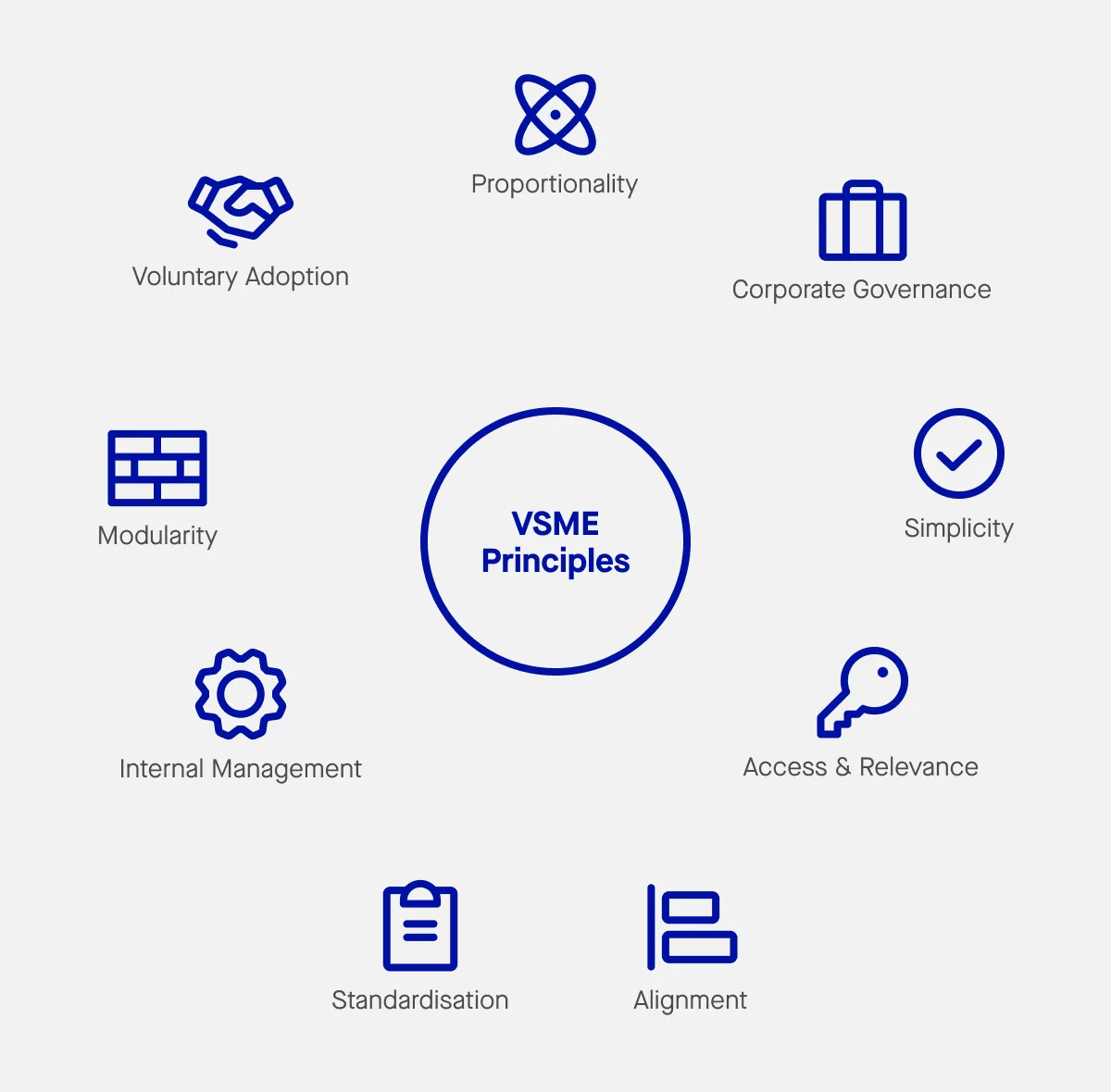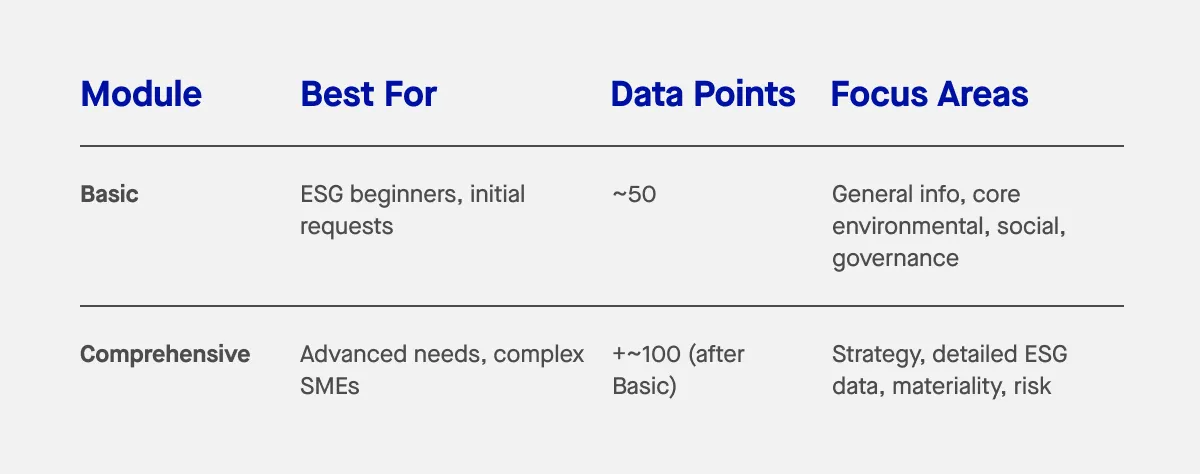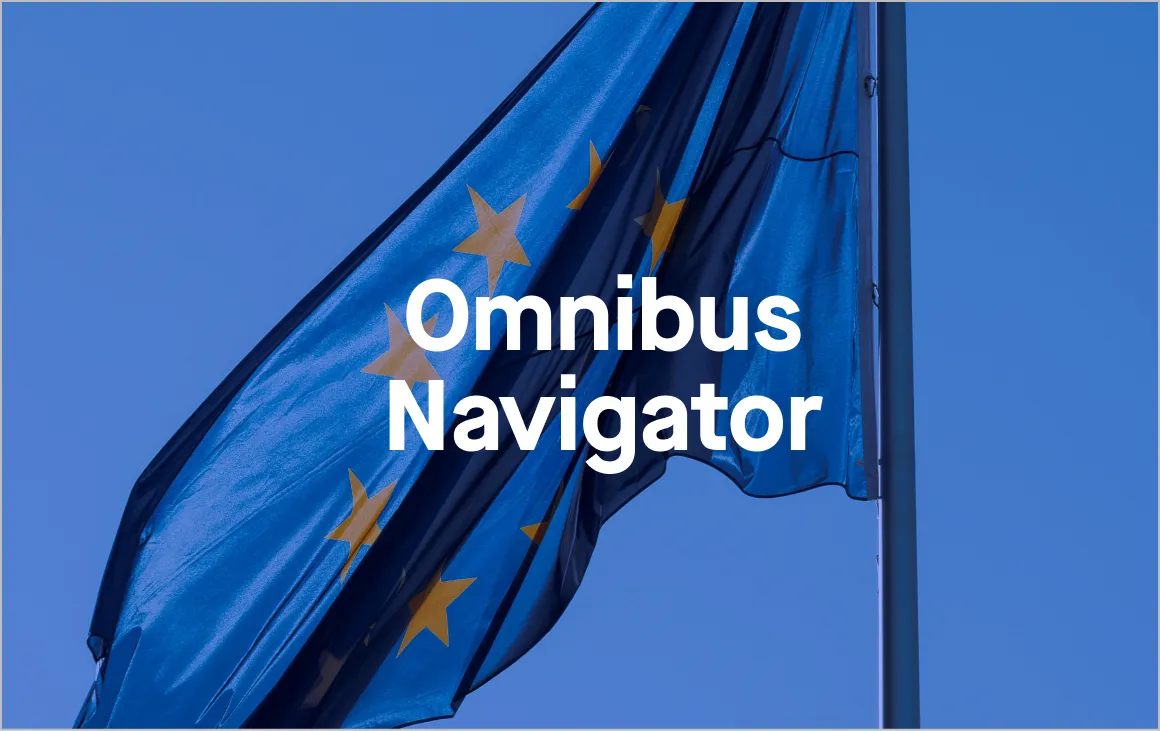Why was the VSME developed?
The voluntary standard was created because many businesses, especially SMEs, face growing pressure to provide ESG data. This often leads to a heavy reporting load with no standardized framework to follow, making it hard to showcase efforts on key sustainability issues and risking being overlooked for financing or partnerships.
The VSME lightens this load by offering a dedicated reporting standard for SMEs. It provides a standardised, simplified framework to help your micro, small and medium business efficiently report sustainability data, respond to ESG data requests, improve information quality, integrate bribery compliance, ease access to finance from financial institutions, and better manage climate-related risks through a structured ESG report. The VSME is a practical tool to meet these ESG demands effectively, enabling improved access to better financing opportunities from banks and investors.
How is the VSME connected to the CSRD?
The voluntary standard is closely linked to the Corporate Sustainability Reporting Directive (CSRD) but is specifically tailored for SMEs. This voluntary framework designed as a structured reporting standard, called the VSME, aims to assist non-listed small and medium-sized enterprises (SMEs) in their sustainability reporting efforts. While CSRD mandates detailed ESG reporting for large companies using European Sustainability Reporting Standards (ESRS), often involving a double materiality analysis, the VSME offers a simplified version for non-listed SMEs.
Key points to understand this connection include:
Voluntary nature: Unlike the mandatory Corporate Sustainability Reporting Directive (CSRD), using the VSME is entirely optional for your non-listed SME.
Alignment with EU principles: The VSME uses core ESRS principles, ensuring your data is understood within the EU framework, especially by business partners who may be subject to CSRD.
Simplified approach: It reduces the number of disclosures, focusing on what’s manageable for the scale of smaller businesses.
Flexibility with thresholds: If CSRD thresholds change and your business falls out of scope, the VSME provides a good alternative for continued structured reporting.
Value chain support: It helps your business provide standardised data to larger clients who need this information for their own CSRD reports.
Essentially, the VSME offers a CSRD-aligned, practical pathway for sustainability reporting if your SME is not directly obligated by CSRD but sees the strategic value.
What are the core principles of the VSME standard?

The voluntary standard is guided by principles designed to make sustainability reporting accessible and valuable:
- Voluntary Adoption: You choose if and when to use it.
- Proportionality: It’s tailored to SME resources, ensuring a manageable reporting effort.
- Simplicity: It aims for clear language and an intuitive structure.
- Modularity: It offers Basic and Comprehensive Module options to fit your business’s capacity and can be scaled.
- Standardisation: This helps reduce the need to answer multiple, varied ESG questionnaires.
- Alignment: The standard is coherent with the broader EU sustainability framework (ESRS).
- Access and Relevance: It helps demonstrate performance to improve access to finance and markets by focusing on essential ESG disclosures typical for SMEs.
- Corporate Governance: Emphasizes accountability and transparency in reporting sustainable practices, aligning with sustainability reporting standards and regulations.
- Internal Management Tool: It aids in managing your own sustainability performance and risks.
These principles empower your business to turn reporting into a strategic advantage.
VSME reporting modules: Finding your fit

The VSME reporting framework offers two modules for flexibility, allowing you to choose the best approach for your business: the Basic Module and the Comprehensive Module.
The Basic Module: A solid foundation
This module is ideal if your micro, small and medium business is new to reporting or faces initial ESG data requests. It requires around 50 essential data points covering relevant data:
General Information: Company structure, sector, size.
Environmental: Core environmental metrics (energy, Scope 1 & 2 emissions, pollution, water).
Social: Workforce indicators (numbers, training, fair wages, health & safety).
Governance: Key governance metrics (anti-corruption, legal fines). This module provides a solid foundation for ESG transparency without an overwhelming workload.
The Comprehensive Module: for in-depth reporting
This option is for SMEs with more complex operations or greater stakeholder demands. It’s important to note that you must complete the Basic Module’s requirements first. The Comprehensive Module then adds approximately 100 additional data points, detailing:
A materiality assessment is crucial in this context to determine the relevance of sustainability topics to your business.
Strategy: How sustainability is integrated into your business model and ESG strategy.
Environmental: More granular emissions data, GHG reduction targets, and climate risk plans.
Social: Policies on labour, human rights due diligence, and DEI initiatives.
Governance: Information on board diversity and detailed risk management processes. This structure, supported by EFRAG guidance, lets you choose a reporting level that suits your current situation and scale your sustainability initiatives over time.
Reporting under VSME framework requires structured information based on your chosen module, including disclosures related to sustainability risks if your company operates in sectors exposed to specific risks.
For both modules, you’ll need to provide:
- A clear statement of VSME module adherence.
- The defined reporting period and scope.
- Accurate and reliable VSME data points (though a formal audit is not mandatory).
Key disclosure categories
The specific details will vary by module, but generally cover:
- General Details: Your company profile, structure, and any sustainability commitments.
- Governance: Anti-corruption measures. The Comprehensive Module adds more on ethics, gender diversity and board oversight.
- Environment: This includes climate data like energy use, greenhouse gas emissions, and Scope 1 & 2 emissions (the Comprehensive Module may add Scope 3 elements, targets, and transition plans), plus information on pollution, water use, biodiversity impacts, and resource/circular economy practices.
- Social (Workforce): Employee numbers, working conditions, health & safety, and training. The Comprehensive Module expands on DEI and value chain social issues.
- Strategy (Mainly Comprehensive): How sustainability features in your business model, your risk/opportunity assessment, and stakeholder engagement.
Important considerations for your report
- Focus on topics relevant to your business context and stakeholders, emphasizing the importance of strategy development in implementing the Voluntary Sustainability Reporting Standard for SMEs (VSME).
- The Basic module has approximately 50 data points; the Comprehensive adds around 100 more.
- Provide both descriptive (qualitative) and numerical (quantitative) information.
- Utilise EFRAG’s detailed guidance for clarity. This approach ensures a credible and standardised account of your sustainability efforts.
What are the benefits of using the VSME framework?
Voluntary VSME reporting offers significant benefits for your business:
It can enhance your access to finance from financial institutions and help meet investor expectations, boosting credibility with customers and business partners (particularly large corporate clients). This, in turn, can open doors to new market opportunities and strengthen supply chain partnerships. Adopting VSME can future proof your business by ensuring it remains competitive and adaptable to potential regulatory changes.
Internally, the process helps identify climate-related risks and social risks, often leading to cost savings through better resource use and improved efficiency. Furthermore, adopting VSME prepares your business for future regulations, helps attract talent, and offers a standard way to respond to ESG data requests and share your sustainability initiatives. VSME effectively turns reporting into a strategic tool for real value, forming a core part of your long term sustainability strategy.
How can you get started with the VSME reporting process?
Starting your VSME implementation involves these practical steps:
- Assess Needs & Expectations: Understand why you’re reporting. Are financial institutions or key customers asking? What are current stakeholder expectations, including those of key stakeholders? Knowing your business context is key.
- Choose Your Module: Decide if the Basic or Comprehensive Module suits your micro, small and medium enterprise. The Basic module, with its essential ESG disclosures, is a good start if new to reporting.
- Focus on ESG Data Collection: Identify required environmental metrics, social data, and governance metrics. Establish processes for ESG data collection.
- Understand Requirements: Familiarise yourself with EFRAG’s guidance for the VSME reporting standard for SMEs.
- Align with Your ESG Strategy: Consider how reporting fits your broader sustainability strategy and sustainability initiatives. Use it to drive improvements.
- Prepare & Share: Compile your structured ESG report and share it with stakeholders.
- Review & Improve: Use your first report as a baseline for future progress.
In summary
Navigating the increasing demands for sustainability information and tracking ESG performance can be complex, but standards like the VSME framework offer a clear and manageable path forward, especially for small and medium-sized enterprises. By providing a proportionate, voluntary framework, the VSME empowers your business to not only meet stakeholder expectations but also to embed sustainability into your core sustainability strategy. Whether you’re just starting to consider sustainability issues or looking to refine your approach, the VSME provides a valuable tool to build a solid foundation, report credibly on your sustainability initiatives, and ultimately, enhance your business’s resilience and competitiveness in an evolving world.






